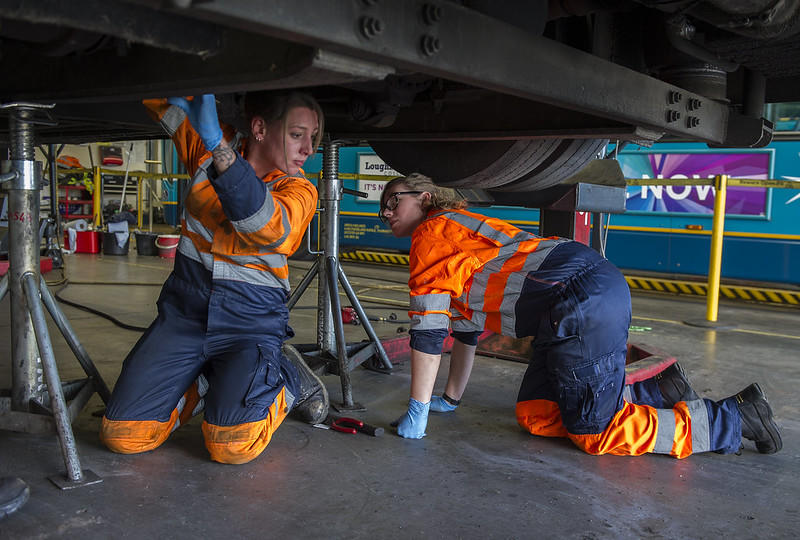Chapters
GCSEs are right around the corner and this year's exam schedule is set. Everyone is still debating whether these exams serve any purpose, though. The old question of whether GCSEs prove anything was made more pertinent thanks to England's updated school-leaving guidelines.
Two years ago, England set the official school-leaving age at 18. Students could enrol in college, undergo an apprenticeship or engage in another approved work-study partnership. But they are no longer permitted to abandon their formal studies after sitting GCSEs.
This new regulation has provoked fierce debate across the country. To make matters fierier, people have increasingly come to the conclusion that GCSEs are useless. They don't reflect what students have learned, only what they've memorised. And the process is unnecessarily stressful and overly complicated.
If you're to sit GCSEs this year, no doubt you have a few things to say on the subject. Won't you let us know your thoughts in the comments section below? In the meantime, your Superprof arms you with resources to make the most of your ordeal:
- the best GCSE revision websites
- apps to help you keep to your revision timetable
- tips for effective study sessions
- where to find help as you revise for GCSEs

The Debate Surrounding GCSEs
As mentioned in this article's introduction, England's guidelines mandate that every student must stay in school until they are 18 years old. Lawmakers, educators, parents and students alike are debating the worth of sitting GCSEs with renewed intensity. The average student is 16 years old when s/he sits with them; that leaves two more years of formal education for them to endure.
Many students went on to prepare for their A-Levels even ahead of this new rule. Others sought out apprenticeships to jumpstart their life as wage earners. For most English students, these new regulations mean little. They would have continued with their formal education, anyway.

Those new mandates mainly impact school leavers; some are so fed up with school that they have no inclination whatsoever to pursue any more lessons. Others may take over the family farm or business, thus needing no further credentials. Still others, perhaps of the genius sort, may go on to make their mark as entrepreneurs.
For any of these options, earning decent grades on a satisfying number of GCSEs would have been enough. Now, with no option for leaving formal education after the last mandatory Key Stage, what's the point of sitting those exams?
The Trouble with Scrapping GCSEs
Scotland, Northern Ireland and Wales have not changed their school-leaving age regulations. Only England has implemented those changes. Scrapping GCSEs throughout the UK would be unfeasible because they are still required in those other countries. They are also deeply embedded in English systems.
If you've no stomach for further academic study, you still need GCSE results to secure an apprenticeship and a decent-paying job. Granted, you may snag a position in a respectable firm with only a handful of GCSE marks. But studies show that those with lower marks generally earn less and are afforded fewer chances for advancement.
Let's say you're up for promotion against someone who did better than you on their GCSEs. All else being equal, you will miss out on the higher pay and greater prestige rising through the ranks could bring. Worse, if you pass on sitting A-Levels and are not thinking about university, you'll be forever at the bottom of the earnings reports.
As integral as GCSE results are to the way we do business - hiring, compensating and retaining employees, scrapping them altogether is not going to be easy. That's why you have to knuckle down, start studying and get the best marks you can. Your future depends on it!
Websites with GCSE Study Resources
Studying for your GCSEs can be a big challenge. The stress of preparing for your exams and the effort you need to make to revise can be overwhelming. Particularly when your teachers are too busy to give you any one-to-one help. However, there are plenty of websites that can support you with your studies and help you to cope with your exam nerves.
Revision websites like Bitesize and gcsEASE can provide GCSE resources and support. Particularly if you are looking for study tips for a particular type of exam or assessment.
For example, you can find tips on Bitesize for speaking and listening exams for language courses. You might also take their advice on creating a portfolio for some of the vocational GCSEs supported by gcsEASE. There are also good GCSE resources online that can provide general advice on study skills and exam techniques.
You can lower your stress levels and increase your chances of GCSE success if you learn how to make the most of your revision time. You might also develop test-taking strategies so you won't feel overwhelmed when confronting your test booklets. Some of the exam board websites provide support to help you to understand what is expected of you in your assessments and exams. You can also find some good study tips on some of these sites.
The AQA website has good revision advice and it lay out what to expect on exam day. You might find such information useful even if you are testing through a different exam board. Knowing what will happen in the exam room can make a big difference when you are sitting your first big exams.
Education Scotland has good advice for students preparing for the Scottish equivalent of GCSEs - the Highers. The tips for second/third-level students will be useful if you want to learn how to make the most of your time in class. It outlines revision techniques like using mind maps to understand complex topics. This is the best place to start looking for study support as the site covers all of the skills that you will need during your course.
Education Scotland also offers time management tips. These can help you if you find it hard to adjust to your GCSE workload or if you need help keeping up with the workload in any of your classes. I found them particularly helpful for my business studies review sessions.

If you want some more help with your studies, the Open University website also has some good tips. Granted, some of the advice there goes beyond what is expected of you at the GCSE level. Still, many of the sections on skills like note-taking will be very useful. The advice on handling exam stress is also very good on this site.
Another good resource is the study guide created by the publisher Collins. It includes practical advice on note-taking and other study skills, as well as some good tips on how to manage your time and cope with exam stress. This site will be useful as you get ready for your exams. These tips will help you to come up with an effective revision timetable.
The practical study tips these sites provide can be very useful. But if you are feeling stressed or anxious about your exams, you can find support online that will help you to cope with your nerves.
The Childline website is the best place to look for help if you are worried about exams or have other problems that might affect your studies. This page gives great advice on coping with GCSEs. You can find tips to boost your confidence, help you relax and get a good night’s sleep before your exams. You can also call Childline to speak to an advisor about your worries.
If you are looking for more one-to-one support, Superprof can connect you to a personal tutor who will be able to support you through your GCSEs. Sometimes it helps to have individual attention. When your teachers are too busy to provide it, an online tutor can be an important source of support.
Diversify Your Studies
As you likely already know, you are required to sit Maths and English GCSEs. You must also sit at least one science subject: chemistry, biology or physics. Furthermore, you are expected to sit a Language exam - either modern or dead language and a humanities subject, such as Geography or History.
These five core subjects represent the minimum number of exams students may select and still earn their school-leaving certificate. On average, students select eight subjects to test in; the more ambitious ones go for a maximum of 12. But choosing more subjects is not what we mean by diversifying your studies.
Teaching to the test is a common criticism of standardized exams. Teaching to the test means covering only the information students will be tested on. Students, parents and educators all resent that teachers have no choice but to teach to the test.
Let's say you've selected History for your Humanities subject. Your study material will cover the Normans, the Tudors and war in the 20th Century. Settling Australia, dealing with China and colonising India are all covered under the larger topic of how Britain became an empire. That's History GCSE's sum total.
In all cases but especially when reviewing for GCSEs, there is so much more to any story than the blurbs printed in study materials. Teachers have neither room nor time to encourage thought-provoking discussions or critical thinking exercises. They're stuck between curriculum demands and scheduling expectations, just like you.
In a sense, the way history is taught makes dramatic events seem like they happen in a vacuum. However, when studied in-depth, it's easy to see history more as a chain of causative events.
To truly gain an understanding of the subjects you study, don't repeat teachers' methods. Don't just study to the test; find materials outside of the GCSE study bubble. Those are materials and information designed to help you get a good grade on your exam. Dig deeper to find out why the Normans wanted England bad enough to die for it and why American university students protested against the Vietnam War.
Go beyond the bubble in every subject you will test in, even Religious and Sex Education if you chose that GCSE subject. That's the only sure way to earn a top grade in everyone. Like it or not, you have to sit these exams so you may as well do the best you can.
Preparing for GCSEs with a Private Tutor
The statistics don't lie: students who review for GCSEs or any school exam with a tutor earn better marks. But hiring personal tutors is another ongoing debate on the topic of education. Some families can easily afford private tuition while others can barely afford to put food on the table.
Some people feel that spending money on private tutors unfairly advantages students whose families can pay for extra lessons. That leaves those who can't pay even further behind. It doesn't have to be that way.

Hiring a private tutor only sounds extravagant. Have you seen some of the prices for an hour of tuition lately? Tutors' rates depend on the subject(s) and the level of education and experience you want your tutor to have. You may pay only a few pounds for an hour of lessons with a suitable tutor.
The rule of thumb for selecting a tutor is that s/he should have at least one level of education higher than you. So, as you're preparing for GCSEs, you could have a first-year university student as a tutor. Or even someone in college who is revising for their A-Levels. Even better: tutors give lessons online, often at a discounted rate.
If your tutor doesn't come to your home, s/he won't have to add travel expenses to your hourly fees. Education technology and video chat platforms like Skype and Zoom make online lessons more engaging and memorable. Zoom's interactive whiteboard and other features make online collaboration a breeze for tutors and students.
Recording tutoring sessions is another point in favour of online tutoring. You can play them back later if you need to refresh your memory on what your tutor said. Note: it's easier to record on some platforms because they have that feature built-in. Others require you to download and install a companion app to record your sessions.
With all of that being said, let's be realistic. What are the chances that you will engage a tutor for English, a separate one for Maths and yet another for Health and Social Care? Do you need to have a tutor for every subject?
Of course not! You only need a tutor for the subjects you have the most difficulty with. In fact, you may get by by engaging just one tutor. There's a reason for that.
Tutors are knowledgeable about their subject matter; nobody will argue with that. But the best tutors function more like academic coaches. They help their students develop study skills and thinking abilities. They share memory 'tricks' so that you will recall information more easily come exam time.
As we mentioned in the last segment, engaging a tutor gives you more than test prep help. A good tutor helps their students build self-confidence.
The biggest challenge to taking exams is doubting one's ability to do well, along with being afraid of failure. A dose of nerves is perfectly normal but being overwhelmed with fear is not. Even after reviewing until your eyes fall out, you might still worry about how you will do on your GCSEs. Perhaps a tutor would be just the resource you need to succeed.
Superprof has tutors for every subject from maths to languages. Superprof academic coaches are trained and experienced in helping students prepare for exam season. With Superprof, every tutor has their own page so you can see their level of experience and the subjects they specialise in. Most importantly, you can read testimonials from other students that tutor helped.
You will spend days - weeks, months, even! on GCSE revision. With the resources listed in this article, hopefully, you will learn everything you need to know for a positive outcome on your exams. And, of course, Superprof is standing by, ready to lend a hand.















Is there any support for adults